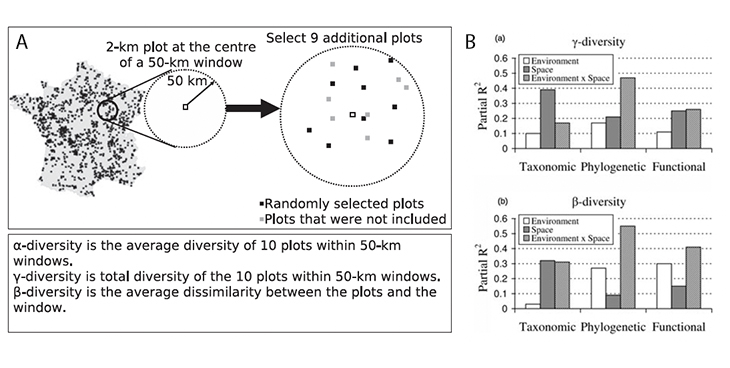BEYOND TAXONOMIC DIVERSITY PATTERNS: HOW DO ALPHA, BETA AND GAMMA COMPONENTS OF BIRD FUNCTIONAL AND PHYLOGENETIC DIVERSITY RESPOND TO ENVIRONMENTAL GRADIENTS ACROSS FRANCE ?
Meynard C.N., Devictor V., Mouillot D., Thuiller W., Jiguet F. and Mouquet N. (2011).
Global Ecology and Biogeograhy, 20, 893-903, doi:10.1111/j.1466-8238.2010.00647.x
Key message :Our aim is to ask the extent to which functional traits and evolutionary backgrounds vary among species in a community or region. We use a spatial partitioning of diversity where gamma diversity is calculated by aggregating information on local communities, alpha diversity corresponds to diversity in one locality, and beta diversity corresponds to the average turnover between localities and the region. Changes in gamma diversity are driven by changes in both alpha and beta diversity. Low levels of human impact generally favour all three facets of regional diversity and heterogeneous landscapes usually harbour higher beta diversity in the three facets of diversity, although functional and phylogenetic turnover show some relationships in the opposite direction. Spatial and environmental factors explain a large percentage of the variation in the three diversity facets (>60%), and this is especially true for phylogenetic diversity. In all cases, spatial structure plays a preponderant role in explaining diversity gradients, suggesting an important role for dispersal limitations in structuring diversity at different spatial scales.Our results generally support the idea that changes in regional diversity are the result of changes in both local and turnover diversity, some environmental conditions such as human development have a great impact on diversity levels, and heterogeneous landscapes tend to have higher diversity levels. Interestingly, differences between diversity facets could potentially ,provide further insights into how large and small scale ecological processes interact at the onset of macroecological patterns.
